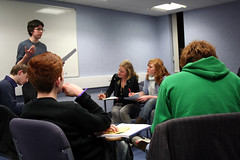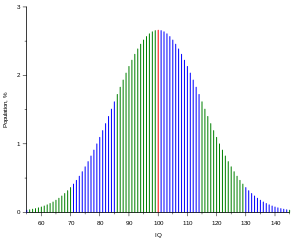 Image by Lizzie Wells via Flickr
Image by Lizzie Wells via FlickrI've just realised, that, although I've been wring essays for a while, I don't actually know exactly what one, very common key word actually means. It's "discuss". What critical / analytical tools are we supposed to bring to the command 'discuss'? It's not describe, not compare / contrast, not assess (evaluate). What does discuss actually ask you to do?Great question, and sensible to start off (as you do) by stating some of the things that 'discuss' is not. As we'll see, I think there is also a bit of 'assess (evaluate)' in 'discuss', but it's something more as well.
First, if we are to understand the beast, we need to understand where it is found. 'Discuss' questions will often start with a statement or quotation of some kind. Here's an example (picked pretty much at random from a Durham past paper):
'Most conflicts between men and women are reducible to unequal parental investment.' Explain and discuss.This is the classic 'discuss' question: it gives you something to get your teeth into (a controversial, striking or interesting statement), and then tells you to get your teeth into it. In this particular example you have a bit of 'explain' to do first: most people won't know what 'unequal parental investment' means, so you need to show that you understand that bit of the question before you can proceed.
Now here's an actual dictionary definition of 'discuss':
to consider or examine by argument, comment, etc.; talk over or write about, esp. to explore solutions; debateSo you are being asked to test out the statement in question, using reasoned argument and evidence for and against. You are being asked to be critical (which means not meekly accepting a viewpoint just because a bloke in a dodgy jumper has told it to you). And you are being asked to evaluate, which means working out, on the basis of empirical findings and reasoned argument, whether the theory/methodology/observation/interpretation/conclusion in question is a good one or not.
If the 'discuss' question doesn't have an actual statement or quotation for you to respond to, it may have the following format instead: 'Discuss the idea that...' or 'Discuss the statement that...'. Again, it's a simple matter to pull out the proposition in question, and test it out through the processes mentioned above.
'Discuss' can sometimes be used in a weaker sense, as in:
Discuss what the study of X has told us about Y.Here, you can simply plug in the words 'Write an intelligent, balanced, concise, critical, evaluative, well-supported and well-referenced essay which constructs a strong, clear argument explaining what the study of X has told us about Y.' (You can see why we prefer 'discuss'.) You're certainly being asked to do more than just describe, or to write down everything you know about the topic. In each of these scenarios you are being asked to use evidence to support an argument, draw appropriate conclusions, and all the other things we've talked about on this blog.
![Reblog this post [with Zemanta]](http://img.zemanta.com/reblog_e.png?x-id=76321e51-61c7-4f28-99a1-51cbbfd29681)

![Reblog this post [with Zemanta]](http://img.zemanta.com/reblog_e.png?x-id=8f27a03f-83ad-4dee-9480-11a8c91dedc9)


